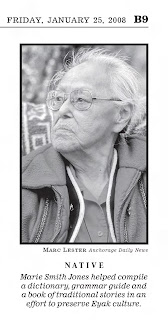In 1992, Marie (age 72) and Sophie (80) were the two last speakers of their native Eyak language, in Alaska
 Marie Smith Jones worked to preserve her heritage as the last full-blooded Eyak until her death in 2008. When she passed, her language, a branch of the Athabaskan Indian family of languages, and one of only 20 native languages in Alaska, died also. Words and tales carrying a thousand years of oral history and cultural tradition will be forgotten.
Marie Smith Jones worked to preserve her heritage as the last full-blooded Eyak until her death in 2008. When she passed, her language, a branch of the Athabaskan Indian family of languages, and one of only 20 native languages in Alaska, died also. Words and tales carrying a thousand years of oral history and cultural tradition will be forgotten. She did not raise her children to speak her language because she grew up in a time when it was taboo to speak anything other than English. But once her last sibling died, she decided to reach out to a linguist at the University of Alaska in Fairbanks. She wanted a written record of her language, in hopes that a future generation will some day resurrect it.
"Language is part of the essence of our whole being," said (1992) State Rep Georgianna Lincoln, a Koyukon Athabaskan Indian who wanted schools to teach local native languages. "It just seems sinful that here we are teaching our children other languages that they will never use again, but our own native language... is being lost."
"Being the last of her kind, for the last 15 years, was a tragic mantle that (Jones) bore with great dignity, grace and spirit," said Michael Krauss, the University linguist and professor who collaborated with her.
I'm sorry we cannot teach our kids to speak," said Sophie Borodkin in January, 1992, "But they don't speak our language." Sophie passed away the following month.




Comments
Post a Comment